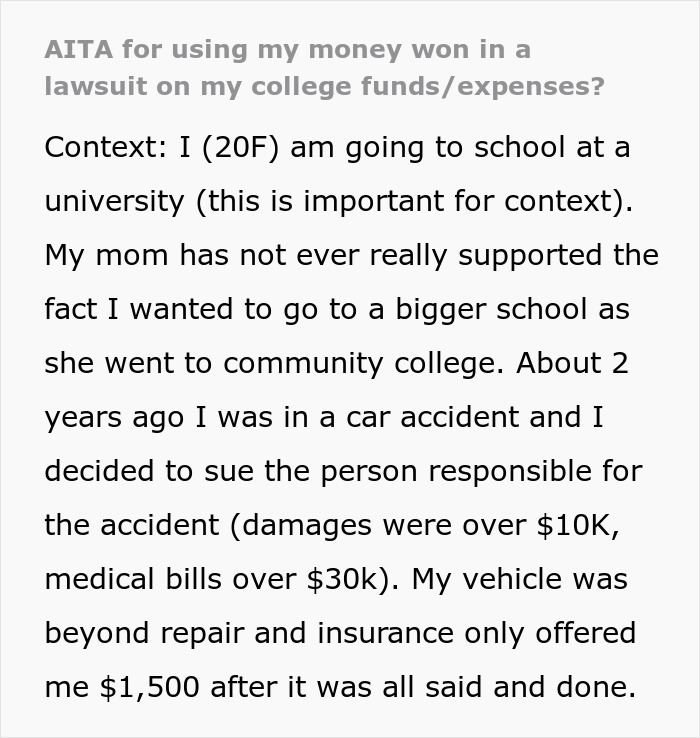As she was planning to spend it on her education, her mother came to her with an interesting request. Because she gave birth to her and raised her, she felt entitled to have this money. The daughter disagreed, so she went on to ask people whether she was a jerk for considering cutting ties with her mom. Bored Panda got in touch with money coach and therapist Fanny Snaith. She told us more about how to establish boundaries with family members when it comes to money and also gave some tips on what to do if you come into a large sum of money suddenly. Read on for our conversation with her below!
Coming into a large sum of money as a college student can really change your life
Share icon Image credits: Element5 Digital/Unsplash (not the actual photo)
This young woman wanted to use the money she won in a lawsuit for college, but her mother disagreed
Share icon Image credits: cottonbro studio/Pexels (not the actual photo)
Image credits: LSouthRanger7084 Share icon Image credits: LinkedIn Sales Solutions/Unsplash (not the actual photo)
Financial coach and therapist Fanny Snaith says it’s important to communicate in cases like this
“Setting boundaries with family members and friends is really important,” money coach and therapist Fanny Snaith tells Bored Panda. She says that whether a family member feels entitled to another’s money depends on their history. However, Snaith emphasizes the importance of communication. “What seems to be lacking here is discussion – yet expectation is present. Conversations around money are so important, yet people find them hard to initiate. My advice would be to find the right time for the conversation, [and] ask the other person.” Snaith says the person should clearly state to the family member the reason for the conversation. She gives a possible script: “Mom, I have received this money, and I want to discuss with you my intentions for it. I want to feel happy about it, so it is important to me that you understand my feelings about it and that I understand yours – with the idea that we can agree.” Generally, Snaith recommends that any financial transactions between family members happen as formally as possible. “If lending, write a one-page contract as to how the loan will work – I have one with my daughter with the money I lent her for her car,” she gives a personal example. “If giving the money, state clearly whether there are any strings attached – make this very clear. Resentment comes very easily when lending with a hidden agenda that is not met,” the financial coach explains. For those who suddenly come into a large sum of money, Fanny Snaith recommends working out your goals. “Take some advice from a financial advisor, for instance,” she advises. “Consider if locking it away will work for you – investing means locking money away for a minimum of 5 years, ideally 10.” “Decisions around what to do with money are based on many things – age, attitude to risk, long-term intention for the money, etc. All those things need [consideration] before making decisions.” Share icon Image credits: CDC/Unsplash (not the actual photo)
Whether children feel like they owe their parents money or gratitude depends on their culture and their upbringing
Navigating boundaries around money with parents can be difficult. Some parents might feel they’re owed financial assistance from their kids because they provided for their children growing up. But experts say that it’s important to set financial boundaries with all family members, including parents. Making children feel like they owe their parents a debt for raising them is not only selfish but unhealthy as well. An associate professor of philosophy at the University of Colorado, Boulder, Iskra Fileva, writes that it’s not okay, even when it’s not among family members. “The cost of paying a debt of gratitude must not be a burden that makes the other wish you’d never done anything for them to begin with,” she claims. Of course, this also depends on cultural and social aspects. Every family is different, and what’s appropriate to some may seem overboard to others. Yet, according to Money Digest, children shouldn’t feel pressure to give their parents money. They should express gratitude in ways that feel appropriate to them. Ultimately, whether the child wants to help their parents when they’re an adult depends on what their childhood was like. “As an adult child, how much you feel you owe your parents depends on how you were raised,” Social Psychologist Dr. Susan Newman, author of Under One Roof Again: All Grown Up and (Re)learning to Live Together Happily, told Fatherly. “If you had an absent dad, you’re going to feel quite differently and may be reluctant to feel you owe him anything, versus a mom who was always there.”
People encouraged the young woman and told her she was not the jerk in this situation
Anyone can write on Bored Panda. Start writing! Follow Bored Panda on Google News! Follow us on Flipboard.com/@boredpanda!























